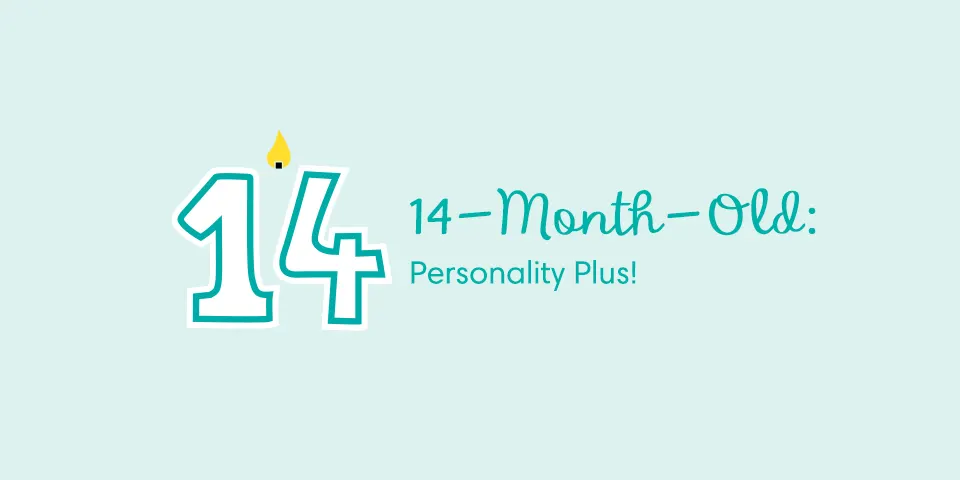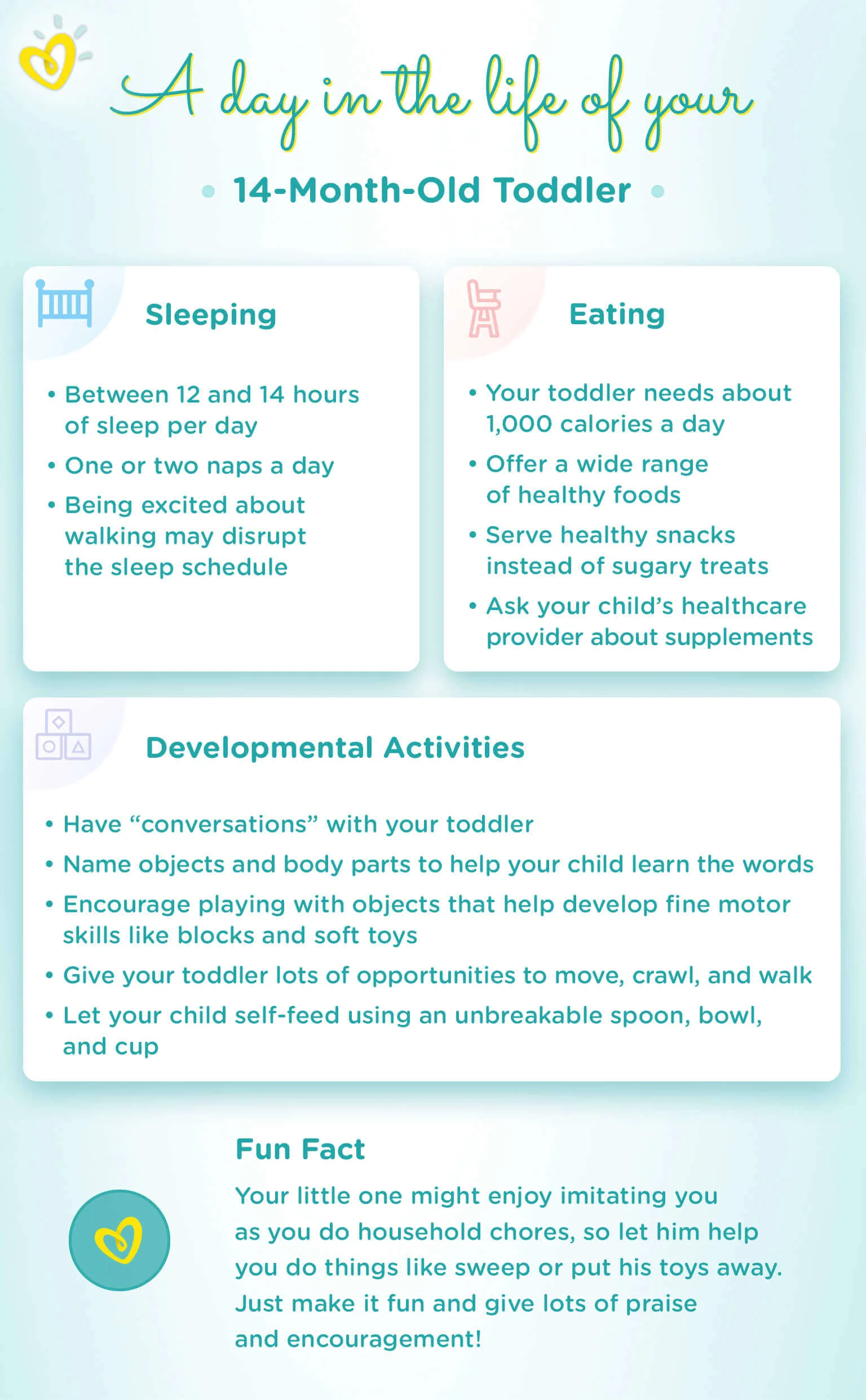14 Month Old Toddler Development – Personality Plus!
Congratulations parents! Your little one will soon reach the 14-month-old baby milestone. Life with a toddler will now be full of fun and thrill in the house as he will slowly start to reveal and grow his personality. For example, you may now find him understanding a lot of what you’re saying. Besides, there’s a lot more you can do to support his healthy development. Read on to understand how you can solve certain issues like separation anxiety at this time.
Additionally, we have also defined some baby development stages your 14-month-old may reach around this time, along with some handy tips on his sleep and mealtimes menus. So, let us get started.
Toddler Development Milestones
If you are a parent of an older sibling or have interacted with parents of other young children, then you might have observed a slight difference in the baby development stages of your toddler as compared with others. In such a case, do not worry because it is normal, as each child grows in his own unique way.
Keeping that in mind, take these baby milestones by month as the kind of things you may probably observe around this time. Some may have already occurred earlier for your toddler, while for others it could take longer than 14 months. If you’re worried about your 14-month-old baby’s development, then it is advised to speak to his doctor.
So, here are some common areas of development and achievement you may notice in your toddler:
Language comprehension:
At this stage, your toddler will begin understanding a lot of things that you say. For instance, you will notice that your little one can actually point to his favourite toy when you ask him to show where it is. Further, to boost his language and comprehension skills, talk to him more about what’s happening around him and readily respond to what he says or does. Speaking to him clearly and slowly by using simple words and short sentences will boost his understanding skills. Around this time, you will also find yourself using less baby speech because it is no longer needed to attract his attention.
Glimpses of independence and dependence:
The 14-month baby milestones may find your toddler becoming more bold and confident in his behaviour and attitude. He may start doing things you’ve told him not to do or perhaps play in a more independent manner than before. At other times, you may find him being clingy maybe because he is feeling tired or anxious. This transition towards greater independence is not steady. For instance, you may find he’s independent for some days before abruptly becoming more reliant on you again. This constant push-pull between wanting to be independent yet needing you right next to you is a sign that your toddler is slowly getting used to the idea of growing up. Support him by offering reassurance whenever he needs it.
Separation anxiety:
It's not uncommon for your 14-month-old to crib when you leave him alone. One way to help reduce his separation anxiety is to let him know what's happening. Tell him that you're going and that you’ll soon return. Give him a quick kiss and hug before leaving. Do not walk out quietly from the house as it can instil a fear in him of you disappearing at any time. Plus, refrain from revealing any anxiety of your own. This could make him even fussier. Once you return, immediately go to him and provide ample attention. This way he will understand that you will always return and keep his separation anxiety at bay.
Self-feeding:
Around this time, you will notice your 14-month-old baby getting better at feeding himself with his fingers, spoon or drinking directly from a cup. Using unbreakable dishes and cups are a good idea for starters, as they won’t be damaged even if they’re thrown from time to time. It is also important to teach him what’s allowed and what’s not. So, if he throws any cutlery across the room, then tell him that’s not allowed. But, if he keeps dropping objects to see you react, then it might be a good idea to remove him from his high chair and help him give a chance to calm down.
Toddling:
At this stage, toddlers generally step with a wide gait with their toes pointed outwards. This can make their steps a little shaky. He may seem to wobble forward from one foot to another with his arms bent at his shoulder height for balance. While it all looks very uncertain and slow right now, especially when he drops balance and falls, but very soon you will be running behind him to catch up with his speed. However, if your 14-month-old is still yet to take his first steps, then don't worry. This is part of the baby development stages month by month and may differ from one child to another. It is likely that he may start walking in the next upcoming months.
Your tiny tot is changing in many ways as he slowly develops himself month by month, but one thing that’ll remain constant for a while is - diapers! Your little one will be needing ample comfy diapers like the Pampers® Premium Care pants. So, download the Pampers App now and win rewards for all your Pampers diaper purchases.
How to Boost Your 14-Month-Old’s Development
Here some simple things you can try to support your 14-month-old’s development:
Make him a part of your routine tasks:
At this stage, toddlers love to be included in family life. So, let your little one help you around the house with simple tasks. For example, play some music and work together to keep his toys in his toy basket. The goal is to make this job fun for babies and not make it seem like a chore. Give him ample time to do the job well and then praise him for helping you out. Another idea could be to give him a dustpan and brush slowly sweep the floor. This will make him feel proud of being able to do a big boy’s jobs. Moreover, helping is a crucial social skill that your child will slowly need to learn.
Encourage a lot of social interactions:
You’ll find that your little one enjoys being around other children who are a little older. He will probably play by himself rather than playing with the other child even if he is beside him. This is called parallel play. Additionally, you’ll find him quite self-centred as he is now the centre of attention and can’t really understand things from another perspective. He won’t like sharing things and may get upset if another child takes one of his toys, even if he has offered it in the first place.
Use actual words:
Now that your toddler has started understanding most of what you’re saying to him, it is better to use real words instead of baby speech as much as possible. For example, when you're reading out a book to him with a picture of a sheep, say a sheep instead of ‘baa baa’ when you point towards the animal. This will help him absorb things faster when he has to only learn one word at a time.
Provide the right discipline:
Discipline here really means guiding and teaching your toddler rather than reprimanding him for doing something wrong. At this stage and in the upcoming years, your tiny tot will be testing his boundaries and discovering his developmental and physical limits. For instance, he might drop food on the floor in spite of you telling him not to. In such a situation, do not go harsh on him. Explain to him firmly but with love and care. This constant need for limit setting for your toddler will help him learn the behaviour you expect from him and develop self-discipline. Therefore, it is necessary for both parents to be on the same page about what the boundaries should be. So, have a discussion with your spouse to clarify the approach. Setting boundaries consistently will help him learn the limits more easily.
Mealtimes And Menus For Your 14-Month-Old
Mealtime spills and messes are a sign that your child is now starting to learn to feed himself without your help. It also makes him learn to eat independently and is a process that’s no less than fun for babies at this stage. He grows better at feeding himself with his fingers or a spoon and even directly sipping from a cup.
Additionally, you may also observe that your little one seems to be less hungry than before. Although growth rates, metabolism, and activity levels differ from one child to another, food for 14-months baby usually comprises 1,000 calories a day. These can come from the three small meals and two snacks you serve him each day. That's not a lot of food as you might think; however, 16 to 24 litres of whole milk can account for approximately 300 to 450 of those daily calories.
Not only that, but you may also notice:
Your toddler consuming close to 1,000 calories a day and eating much more or much less the following day.
The little one craving for a heavy breakfast and then not feeling hungry for the rest of the day.
Gobbling up a lot of his favourite food but then rejecting it a few days later.
Do not stress if your toddler eats less food at a particular mealtime. Go with the flow and offer him a variety of nutritious foods consisting of proteins such as meat, eggs, yoghurt, milk, cheese, fruits, vegetables, and whole-grain foods like pasta, bread, and cereals. Offering healthful options during each meal will give his body the right amount of nutrients he needs for healthy development.
The key is to try serving him food with different tastes and consistencies. Give a lot of nutritious options and let your toddler choose how much of what he wants to eat. For more innovative ideas, take a look at these tips on feeding a 12 to 18-month-old, and also take a peek at this sample daily menu for your 14-month-old baby:

Your 14-Month-Old Toddler’s Sleep Schedule
Witnessing the baby growth stage can be quite wonderful. While some activities and changes can be fun to watch, some can be equally challenging to settle with. One such change will be in your toddler’s sleep schedule. Now, your 14-month-old will only need about 12 to 14 hours of sleep a day. At this stage, he may be even down to a daily single nap just like most of the toddlers by 15 months.
If your little one has recently learned walking, you might find that he is having a hard time winding down during bedtime or naptime. This is because of the sheer joy and excitement of learning to explore the world on his two feet. You may find him walking back and forth in his crib as he practices this new skill. This, however, is normal; your toddler is merely excited about his newfound mobility. However, you must be watchful for signs of tiredness which could lead to irritability. When that happens, let him sleep immediately instead of falling back on the sleep schedule you followed during his earlier stages of development. In time, the joy and novelty of walking will wear off and your toddler will be much easier to settle.
A Day in the Life of Your Toddler
With all the newfound abilities, your life with a 14-month-old baby won’t be dull. Here’s how a typical day may look like at your house:
Your Toddler’s Health: Keeping Safe Outside
As your little one becomes more mobile, it is important to hold his hand and keep an eye on him, especially when you both are out and about. For instance, do not allow him to run away from you when you’re in the grocery store. Be very vigilant when you both are near cars such as when you are on the street or in a parking lot. Also, be very mindful anywhere around water. This is because now those little feet can wander off in an instant and so, the best strategy is to hold his hand. If he tries to wriggle free, talk to him and tell him that you understand what he wants, but you cannot let go of his hand for his safety. At each step, it is necessary that you reason with him by trying to stay positive without sounding angry or irritated.
You might also want to install extra locks to the baby gates and doors in your house. Keep him engaged with toys in the living area so that you can have eyes on him while also accomplishing your daily chores. Although he may not abruptly run out of the house, it is important that you keep the doors locked at all times.
When it comes to car safety, make sure to keep your car locked at all times, even when it’s in the parking lot or garage.
FAQS AT A GLANCE
At this stage, your 14-month-old baby may need only one or two naps a day. About half of the toddlers at this age come down to having only a single a day.
Your Life as a Parent: Sibling Dynamics
If you have an older child, you may observe a slight change in the dynamics, now that you have a younger child at home. As you’ve read earlier, your toddler is the centre of his own universe and this can make him behave in undesirable ways that your older sibling finds annoying. For example, your toddler might invade his siblings' privacy, take their things as his own, or even sulk if they take their things back. On the flip side, your older one may grow jealous seeing that your 14-month-old gets a little more of your attention. This behaviour depends on the age of your older child. It could be so that he is misbehaving on purpose just to get your attention.
This sibling rivalry should lessen in the coming years as your children will need less of your undivided attention. In the meantime, make efforts to spend quality time with each of your kids. Perhaps, allow your partner, family member, or babysitter to take care of one, while you enjoy some lone time or a fun outing with the other sibling and vice versa.
If you’re planning to shift your 14-month-old baby to a shared room in the future, take a look at our tips on creating a room for your toddler and older child to share.





